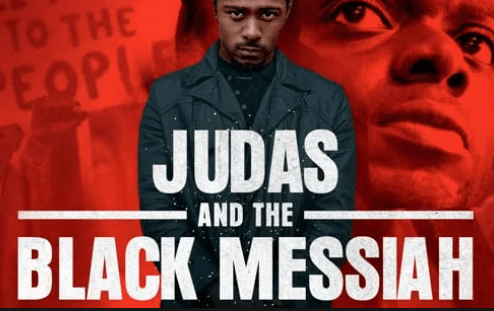By Jamie Penquite-Green, Penrith and the Borders CLP member
Shaka King’s Judas and the Black Messiah offers up an honourable portrayal of the FBI’s Cointelpro infiltration into the Black Panther Party. It does this by way of, and particularly focusing on, the coercion and collusion of a young man turned-FBI informant, Bill O’Neal, played by the skillful LaKeith Stanfield.
Stanfield worked masterfully to bring forth the humanity of O’Neal, who at 19 years of age, carrying an extensive criminal record and facing felony charges, agreed to infiltrate the Illinois Party branch, feeding back information on the rising 21-year-old, Chairman Fred Hampton, who is portrayed in the film by the resonant Daniel Kaluuya.
Beautifully shot, the film demonstrates the depravity and the lengths the FBI affords itself to deal with a perceived threat and the ever-looming presence of the police-state as part of the economically driven prison industrial complex. The film also touches upon the compounding variables of impoverishment and the arduous-lived realities that plague a majority of Americans to this day.
‘greatest security threat’
FBI boss, J. Edgar Hoover, unsurprisingly having been recently found within revealed documents to have given the approval of the assassination of Party Chairman Hampton, had dubbed the Black Panther Party (BPP) the “greatest threat to internal security of the country”. The BPP, righteously tenacious, generated tangible, class-based solutions and actions, to obtain liberation not only for Black Americans from white supremacist violence, still rife within the country, but ultimately looking to defend anyone suffering oppression and marginalization under capitalism within the US empire and beyond.
At a time of President Johnson’s purported ‘War on Poverty’, the Black Panther Party, alongside organised unionisation and strike action, was doing more to lift people from poverty than the government. Illustrating that another life outside of violent, capitalist individualism was possible, is possible, that there is a fight to be had – that each person has a place within that fight and that fundamentally all are greater in strength within the movement.

“We’re going to fight racism, not with racism, but we’re going to fight with solidarity. We say we’re not going to fight capitalism with Black capitalism, but we’re going to fight it with socialism,” Chairman Hampton’s words, still speaking truth directly to the inherent contradictions within capitalism and its inexorable impetus to exploit communities to extract wealth for the few at the top.
Chairman Hampton, looking to build a ‘Rainbow Coalition’, understood and relayed well to others how racism was and is, one pillar of the many used to prop up capitalism. He demonstrated its deliberate use of racism to manipulate, deflect and split apart the masses who have more in common than is often recognized.
A means of demanding justice
Kaluuya, stated in a recent interview, “[the film] shows the danger of apathy” and it demonstrates how valuable individuals truly are; as part of the collective, as a means for demanding justice, but also the pressing danger of being manipulated as a pawn to wreak destruction. In this instance, O’Neal was manipulated within the Party, resulting in the assassination of Chairman Hampton and fellow leader Mark Clark.
Captivating in his address and presence, Fred Hampton’s legacy is unforgettable for those who know him, but at the same time, it is undoubtedly one unknown or even misunderstood by many. His widow, Akua Njeri, speaking in the film, expressed happiness at the movie coming to the big screen and at the inclusion of herself, son and activist Fred Hampton, Jr., and the Black Panther Party Cubs, taking part and striving for a concise, yet accurate, depiction of Hampton.
Revolutionary line of thought
Njeri gives a pertinent take-away of the film – outside of any reservations or shortcomings, it gives an opportunity to the unknowing to spark an interest not just in Hampton himself, but to learn of the Party, beyond the media’s demonizing caricature, all of the other members on and off screen, those who are still living and those still incarcerated. It offers a path to go further on our own, to inquire about the fundamental principles of the Party’s revolutionary line of thought, putting anti-capitalism and anti-imperialism into action through their ardent commitment to the pursuance of justice, guided by the vision of proletarian internationalism.
It also leaves us viewers to reflect and leads us to identify with the individuals on the screen, giving space to recognize such capacity of character like that of Hampton, elucidating the ever-present choice within ourselves, and with hope, ultimately compelling us to the righteous strength of the collective struggle for a better world.



